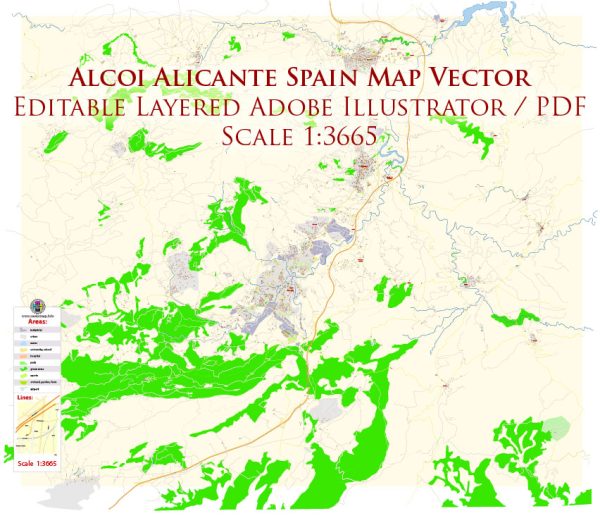The history of urban development in Alcoi, a city located in the province of Alicante, Spain, is rich and multifaceted, spanning centuries of human habitation and growth. Here’s a brief description of the key stages and features of Alcoi’s urban development:
- Ancient Origins: Alcoi has a history that dates back to the Iberian and Roman periods. The area was inhabited by Iberian tribes before being incorporated into the Roman Empire. During this time, the city was known as “Alcudia.” Roman influence left its mark on the urban landscape, with the construction of roads, aqueducts, and other infrastructure.
- Moorish Rule: The Moors, who controlled much of the Iberian Peninsula for several centuries, ruled Alcoi from the 8th to the 13th century. During this period, the city experienced significant growth and development, and the Moorish influence can still be seen in the city’s layout and architecture.
- Reconquista: Alcoi was reconquered by Christian forces in the 13th century, marking a significant turning point in its history. The city became part of the Kingdom of Valencia and played a role in the ongoing struggle for control of the region.
- Medieval Urbanization: In the medieval period, Alcoi saw the expansion of its city walls and the development of a more structured urban layout. The construction of churches and other religious buildings during this time contributed to the city’s character.
- Industrial Revolution: Alcoi experienced significant growth during the 19th and early 20th centuries, thanks in large part to its role as a center for the textile industry. The city’s textile mills and factories became prominent, leading to urbanization and population growth. This period saw the construction of many industrial buildings and worker housing.
- Modern Urban Planning: The 20th century brought about more organized urban planning and the development of public infrastructure, including parks, roads, and public services. The city expanded, and its architecture began to reflect a mix of historical and modern influences.
- Contemporary Development: Alcoi continues to evolve as a modern city in the 21st century. Urban development projects focus on sustainability, cultural preservation, and improving the quality of life for its residents. Historic buildings are often preserved, and new construction is designed with a focus on environmental and architectural considerations.
Throughout its history, Alcoi’s urban development has been shaped by various cultural, economic, and political influences. Today, it stands as a city with a rich architectural heritage, where historical structures coexist with contemporary urban planning and development. The city’s unique blend of history and modernity makes it an intriguing place to explore and study the evolution of urban life in Spain.


 Author: Kirill Shrayber, Ph.D. FRGS
Author: Kirill Shrayber, Ph.D. FRGS